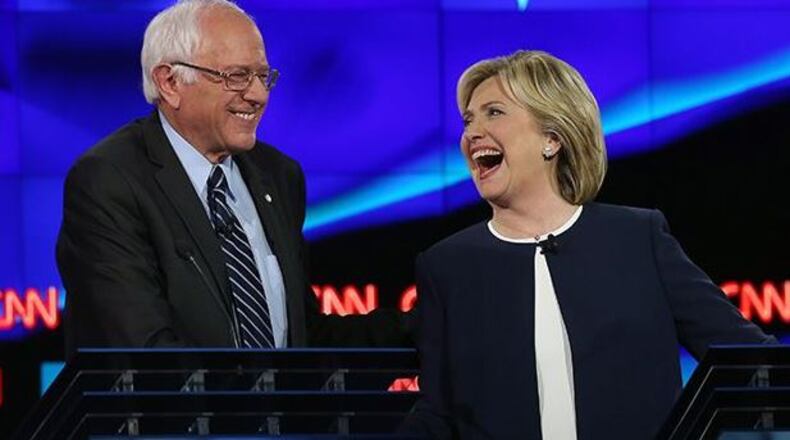Four more states voted Tuesday in the Republican nominating process. Not much changed. We're still waiting for March 15.
Donald Trump won three states. Ted Cruz won one. John Kasich finished a close, but disappointing, third in Michigan. Marco Rubio continued a free-fall apparently induced by the same attacks on Trump that seem to have sparked Cruz's upward trajectory.
Once again, Trump won less than 40 percent of the cumulative vote; he's now at about 35 percent overall in the states that have voted, mirroring his standing in most recent national polls. Once again, Trump won less than 50 percent of the delegates awarded; he remains at less than 45 percent of those awarded to date. Once again, Cruz nearly equaled his delegate haul (receiving 59 to Trump's 73).
Once again, we're waiting for the winner-take-all states, particularly Ohio and Florida.
Super Tuesday is more than a week behind us, but next Tuesday is shaping up as the most important day of voting. The second-largest amount of delegates (367) will be up for grabs, more than will be available in the 40 days that follow as the calendar slows down considerably. The emerging consensus seems to be that Kasich is clearly, but not insurmountably, behind Trump in Ohio and that Rubio is hoping for a miracle in Florida. I haven't checked in with the Kasich camp in a while, but the Georgia folks with ties to the Rubio campaign seem convinced, based on their internal polling, that his chances are far better than the public polls indicate. We shall see. But even if Rubio pulls off that win, it is hard at this point to see how he'd do anything more than accumulate delegates for leverage at a contested convention. His drop-off since Super Tuesday has been that pronounced; consider the math he faces now:
***
I haven't written much about the Democratic race in a while, but Bernie Sanders' upset of Hillary Clinton in Michigan last night is worth a look, I think.
We have a small sample size, just 15 states where exit or entrance polls have been conducted. But if there's a pattern to whether Clinton Sanders wins, it's this: Clinton wins when she gets more than 45 percent of the white vote and more than 75 percent of the black vote. Each time she's fallen below one of those levels, Sanders has won. That, rather than the sheer makeup of the electorate in each state, seems to be the dividing line.
That reinforces a couple of points. First, while much has been made about Sanders' success with white Democrats, Clinton has more than held her own with that segment. She has won a majority of white Democrats more often than Sanders among states with exit/entrance polling (8 to 7). Second, if Clinton were facing a candidate who had any appeal to black Democrats whatsoever, she would be facing a repeat of 2008. Even someone who could consistently hit even 30 percent among that demographic could conceivably be beating her right now. And despite his ineptitude courting black voters, Sanders is, thanks in large part to that Michigan win, forcing her into a longer contest than she ever wanted, or probably expected in her heart of hearts. Clinton isn't as weak a front-runner in her race as Trump is in his, but she could have been beaten and, once we get to the general election, still could be. But she may have the luck this time around of having to face only opponents who are even less capable of winning over voters than she is.
***
One final point: The Republican National Committee's efforts to front-load the primary calendar in the hopes of producing a winner more quickly than in previous years just might be working. If Trump wins Ohio and/or Florida, the math for Cruz or anyone else will be daunting and the rest of the contest more or less a formality. It's just that the beneficiary of this tinkering isn't the establishment favorite it was intended to be.
Let this be a warning to those who favor changes to the electoral process, including but not limited to Republicans who have gotten behind the National Popular Vote movement: You might know what the changes would do, but you never know who would reap the rewards. If it ain't really broke, don't fix it.
About the Author
The Latest
Featured



